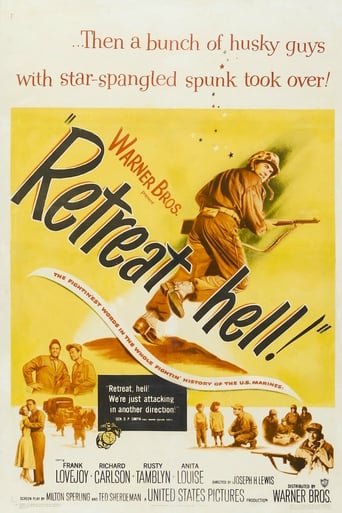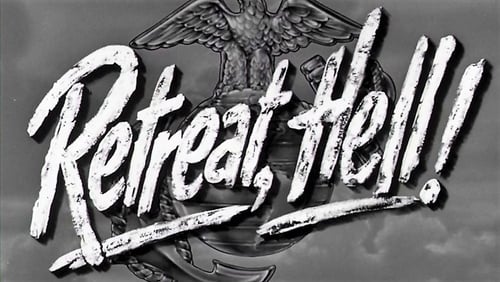Cristi_Ciopron
Directed by Joseph Lewis, 'Retreat …' has action, likable melodrama, well-meant drama (at 1st, I took it for a portrayal, of the captain, but then he morphs into a smiling, paternal officer, almost a priestly one; regardless, there is enjoyable, if conventional, mostly phony portraiture: the sensitive captain, the righteous colonel, the brave kid), a good small cast (playing marines from the 1st battalion of the USMC fighting in Asia, the plot picks up a few people), desolate wintry landscapes, barren frozen hills, 'actual combat film', some _fanfaronade …. Its militarism and colonialism are ideological and obtuse. They were so in the British boys' yarns written a century before this movie was made. J. Lewis makes no attempt at explaining this war, of giving its reason. He merely strives to boost the will to fight. The marines are a sheer grace by their mere presence in a foreign country. From this angle, it's sillier than the British colonialism, which hinted to an aim, beyond the hecatomb itself. 'Retreat …' upholds the militarist ideology of the yank foreign policy. Willis and Rourke have the same ideas today.If you wish for a war movie, the director mastered the craft, Lewis meant to teach kids that fight is worth, also the pride of being a marine, and we are taught, with uplifting music, that 17 is a good age to go to war, because the President cares for you and your family, and the army will gulp as many sons as offered, perhaps the kids are at 1st a bit morose, but only until they come to learn; it's a lively, well directed movie (the smoothness of the ancient Hollywood, so misunderstood of its New Wave French fans …), with a mediocre script taken over by silliness and shamelessness. There are several battle scenes, exciting and suspenseful, like the one with the grenade, or the one with the bazooka and the tank; most of the acting, save the action scenes, which are enthralling, was phony and dissonant, perhaps it seemed less so 60 yrs ago, but perhaps to some it seemed offensive even then. The officers are chivalrous, kindhearted, sensitive and wise …. The captain himself is taught, and learns, grace to the prudence and insight of the colonel. In the 2nd avatar of the captain, his sunny, trusting smile made me almost suspicious of his sanity, but it became unequivocal that it was only meant to show his newfound optimism. At 1st, he was anxious, but then, with help from his colonel, he fights resolutely for his country.As its main subplot (!), 'Retreat …' is a kids' movie, about a boy in war. The title means that the retreat becomes a victory march ('retreat my ass', the triumph of retreating victoriously). So pushing kids to enlist, why not, maybe Lewis believed in this rubbish. Yet I feel like I am being unfair to this movie, even on my own terms, even being given its phoniness; but the craft becomes a tool for militarism and colonialism, and for the will to fight without ever asking why. The objections aside, 'Retreat …' is likable, suspenseful, occasionally dramatic, at first funny, and nicely crafted by a man, J. Lewis, who knew his job and meant no harm.
dougdoepke
The movie traces Marine combat battalion from training base in California to South Korea's Inchon landing to North Korea's Chosin Reservoir and retreat from there to the coast for naval rescue.Several notable features are in this otherwise fairly routine war film. First, it's surprisingly de-politicized for its sensitive time period. The movie was produced in 1952, at a time when the war in Korea had stalemated and anti-communist fervor (Senator McCarthy) was at a fever pitch stateside. One would expect a lot of talk about red aggression and Chinese hordes. However, there's hardly any explanation in the narrative about where the war is or why it's occurring! Instead, the screenplay focuses almost exclusively on Marine Corps professionalism from officers to NCO's to recruits. Looks to me like the movie's purpose is to restore the Marines' popular image following the Chosin debacle, without getting involved in messy politics. After all, Marine combat in WWII had been one of steady advance across the Pacific; at the same time, footage of retreat in Korea shook American confidence in that murky war.Another notable feature is the low-budget film's effort at recreating the horrendous winter weather that plagued the retreat. I recall newsreels of the time of the steep mountains and freezing snow being almost as scary as the combat itself. I doubt the retreat over those mountain passes would have succeeded without the continuous air support.Notable too is the general absence of sometimes silly small talk that characterizes so many WWII combat films. That's understandable since the war in Korea was never popular and little understood at home, especially after the massive Chinese intervention. On the other hand, there's the kind camaraderie and bonding among the troops that could be expected, but none of the light-hearted victory-is-certain banter of 10-years earlier.As other reviewers note, the combat itself is mostly a series of clichés. However, the acting is good and Tamblyn is perfect for his idealized all-American-boy role. But the movie itself is now largely a curiosity dramatizing as it does one of America's few military retreats.(In passing—in my little book, the war was characterized by two massive blunders—first, North Korea's reckless belief that the US would tolerate a unified communist Korea only a few hundred miles from post-war Japan; and second, Gen. MacArthur's over-confident belief that China would somehow allow an American army on China's border {the Yalu river}. The result of these blunders was 3-years of war, thousands of dead, and most ironically, a return afterward to the same divided country {38th Parallel} as before the devastation!)
RanchoTuVu
The Korean War doesn't have the glory that goes with WW2, although there are a few films about that war that have helped shape an image of bitter fighting carried out in even more bitter weather conditions. Retreat, Hell! should be right up there with Pork Chop Hill as the definitive Hollywood depiction of that conflict. It has that deft mix of grim authenticity, of action, and of fine characterizations. It has to be one of Russ Tamblyn's best dramatic parts. A lot of well interspersed and well done action scenes of fighting in barren snow swept hilltops and ravines, with the finale being a furious Chinese charge right into the colonel's tent. In black and white, this film has a pervasive grimness to it, that contrasts with the story of a unit of Marines trying to keep up a sunny and positive spin on a desperate situation. It's a flag-waver, but exceedingly well done.
greenheart
This is a war movie which focuses more on the feelings, emotions and insecurities of the platoon as well as providing a shed load of action & explosions. For this to work, you have to care about the characters. The hard edged Colonel is well portrayed and you can see the humanity leaking out of him as the pressure intensifies. The Captain who is centre of attention early n, fades into the background somewhat. The real star is young, fresh faced McDermid. You feel as if you are with him every step of his journey, you feel his nerves, pain & bravery. Although in black and white, you can almost see the red mist descend in one poignant scene. There are loads of explosions and plenty of action for the late night viewer but this is a war film with a deeper than average plot line.




